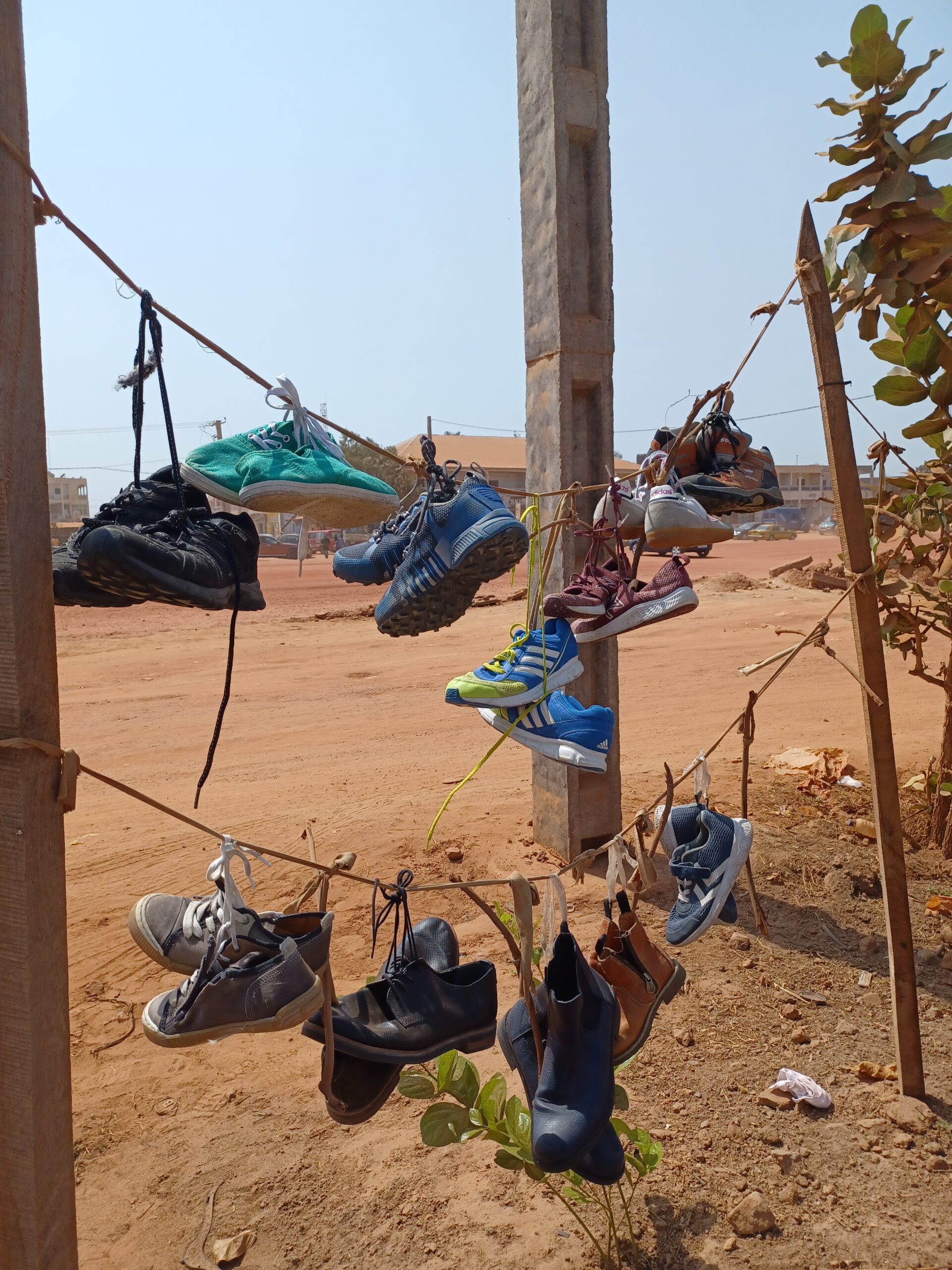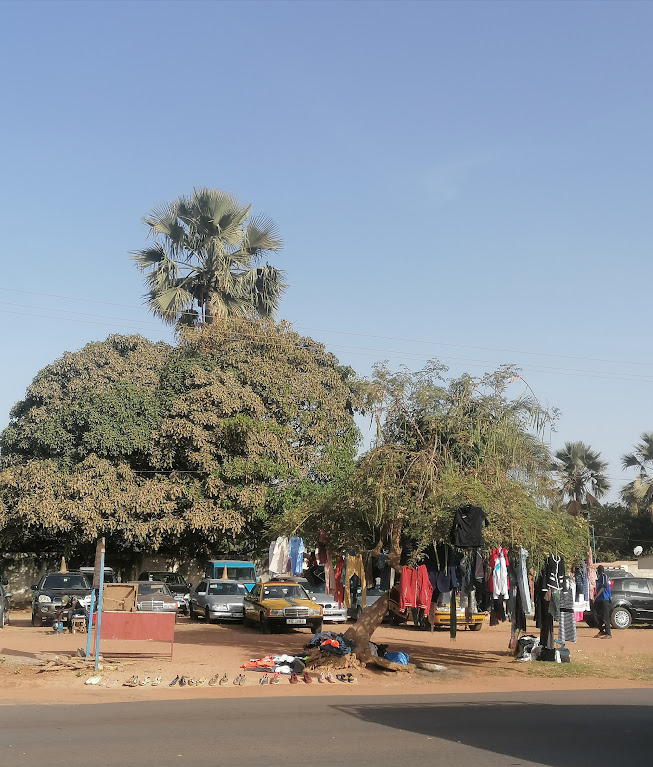
„What the heck, are these my shoes?!?“
This was my first thought when I was passing a house on which was written „Goods from Switzerland“, with used shoes dangling on two ropes in front of it. One pair of them almost looked like those which I dumped just a couple of weeks ago before moving to Africa. When I had a closer look, I could ascertain though that they were not previously owned by me, but just looked very similar.
Second hand articles are all over here – shoes, clothes, furniture, toys, cars, trucks, etc., and it’s something I have been thinking about deeply. The general idea in Gambia is that it’s better to get a second hand item from Europe than a new item produced in The Gambia, such as African clothing for example. Although there is space for African clothing in Gambian society (for example on certain festival days), it is generally considered a sign of poverty if you wear African clothes 24/7. Goods from abroad are considered superior, even if they are second hand.
In this place, I would like to mention that in some countries, the trade of second hand clothes is forbidden, for example in India. In India, second hand clothes can only be obtained in illegal markets. And why is this so? Because the Indian government doesn’t want to jeopardize the local economy by bringing in goods from abroad, at least in the clothing sector. Although both countries, India and Gambia, share the trauma of having been colonized by the British, India in many ways managed (so much more than Gambia) to get actual independence, economically as well as psychologically…although you also get a whole generation of Indians who’d rather wear jeans when it’s 45 degrees Celsius than wear a light and comfortable cotton dhoti (traditional Indian dress for men) or a light cotton skirt or sari (traditional Indian dress for women). In India, however, wearing traditional clothes is not seen as a sign of poverty, but rather as a sign of backwardness, conservatism and old fashion.
Whilst it is okay to gift someone a second hand item in The Gambia, in India it’s an absolute No-No! Especially SHOES is something Indians would never get second hand, because they believe that whatever bad the previous owner of the shoes has done whilst wearing them will be passed on to the current owner. In other words, you’d be literally walking in the shoes of the previous owner, even if you don’t know him/her.
As the youngest and last child out of four, I know exactly how it feels to wear used clothes, since I had to wear most of the clothes of my older siblings. And in fact, it does have a psychological impact. It makes you feel small, while the others have already grown up. It makes you look up to them, because they have already passed the stage at which you currently still are. You are the very last one in the row; there is nobody after you.

And that’s the case with Africa, too. They are the last one’s. Looking at some of the world’s ranking indexes such as the Human Development Index (HDI), Switzerland (my native country) is on the very top, whereas African countries are at the very bottom: https://worldpopulationreview.com/country-rankings/hdi-by-country
In Switzerland, the collection of used clothes and shoes (aka „Altkleidersammlung“) is something which takes places several times a year in a very organized manner. People are provided with big plastic bags via post, on which the date of collection is printed. They then go through their cupboards and throw the items which they don’t like anymore (or which don’t fit anymore) into those bags and tie them. On the day of collection, these bags are put out on the roads, and a vehicle comes and collects them.
A fairly recent phenomena has appeared, namely the stealing of these used clothing bags. Although it’s not sure who steals the bags from the streets before the vehicle comes, it’s not difficult to understand that the people who do it know about the treasures hidden inside these bags. And yes, the second hand clothing trade is a HUGE business indeed! What makes me sad is the fact that the best second hand items will stay in the country, i.e. will be re-sold in the second hand market of Switzerland. Therefore, all second hand goods which will eventually reach Africa are of second or third class even. And again – Africa is at the very bottom of the list.
Purchasing second hand items in Switzerland is a choice. Personally, I used to visit so-called thrift stores at least once a month. Also, there is an awesome online second hand market, namely ricardo.ch which offers an immense choice of well-maintained second hand items. Every second person in Switzerland owns an account on this platform! Purchasing used items in my country of origin is not seen as a sign of poverty, but rather as a sign of sustainability and hipness.
But let’s return to Gambia, and the impact the import of second hand items has on the local economy and the minds of people here. One thing is very obvious: It weakens the local economy, and it strengthens the dependency on Europe, economically and psychologically.
Do we want The Gambia to stay a dependent nation with a low self-esteem? If I am a priviledged white person who earns my income from exporting used items to The Gambia, then I would want that this nation stays dependent on me forever.
However, I would like to encourage The Gambia to wake up and strengthen its local economy. Stop depending on other countries! MAKE YOUR OWN! Become self-sufficient. Try to get over your post-colonial trauma and rise! Stop blaming the government for not helping you, and try to be the change you want to see. Boycott goods from outside. Be proud of your cultural heritage! Proudly wear African fabrics and sit on bamboo furniture – they look beautiful! And don’t let anyone tell you otherwise.
